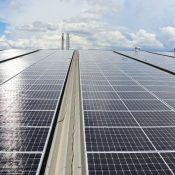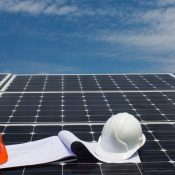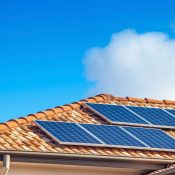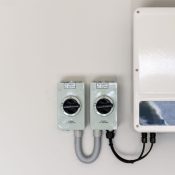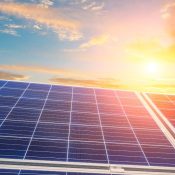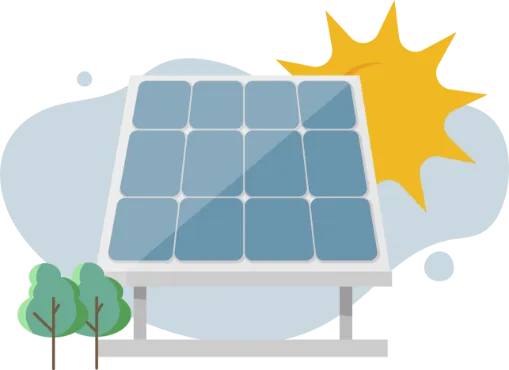Thin-Film Solar Panels: Pros, Cons, And Suitability for Irish Weather

Are you considering solar panels for your home in Ireland but unsure which type to choose? We know the feeling! Thin-film solar panels might be an efficient and affordable option.
This article will explore their pros and cons while examining how they perform under Irish weather conditions. Intrigued? Read on!
Thin-Film Solar Panels: Pros, Cons, And Suitability For Irish Weather
Thin-film solar panels offer a lightweight and low-profile design, making them easy to install on various surfaces. They are also inexpensive compared to other types of photovoltaic panels and come in different materials, providing flexibility in their use.
However, their low efficiency and space-consuming nature can be drawbacks and make them less durable than traditional panels.
Lightweight, low-profile design (Pro)
The lightweight, low-profile design of thin-film solar panels is a significant advantage. These properties make them easier to handle and install than traditional solar panel types.
Panels that aren’t bulky can be effortlessly transported and lifted onto rooftops or other structures without requiring heavy-duty equipment. Moreover, their sleek profile doesn’t undermine the aesthetic appeal of your house; they seamlessly blend into roofs without causing any visual disruption.
With these characteristics, thin-film PV panels offer more flexibility in application, opening up new possibilities for integrating solar technology into homes across Ireland.
Inexpensive (Pro)
Thin-film solar panels are an attractive option for Irish homeowners due to their affordability. Thin-film panels cost less than other solar panels because they require less photovoltaic material during manufacturing.
This translates into lower overall costs for installation, making them a cost-effective choice for those on a budget. Despite being more affordable, thin-film panels offer decent efficiency and durability, ensuring you can enjoy renewable energy’s benefits without breaking the bank.
If you’re looking to save money while harnessing clean and sustainable energy from the sun, get thin-film solar panel services from Going Solar are worth considering.
Available In Different Pv Materials (Pro)
Thin-film solar panels have the advantage of being available in different photovoltaic (PV) materials. This means that homeowners in Ireland have options for choosing the material that best suits their needs and preferences.
Popular PV materials used for thin-film panels include CdTe, CIGS, and CIS, which offer a combination of robustness, flexibility, low cost, and high efficiency compared to other types.
This variety allows homeowners to select materials that align with their requirements and budget constraints.
Low Efficiency (Con)
Thin-film solar panels have a drawback when it comes to efficiency. Compared to other types of solar panels, such as monocrystalline and polycrystalline, thin-film panels are less efficient in converting sunlight into electricity.
This means they may produce less power for the same amount of sunlight. However, it’s important to note that even though thin-film panels have lower efficiency, they can still work on cloudy days, although with reduced effectiveness.
So while low efficiency is a con for thin-film solar panels, their affordability and durability may still make them an attractive option for homeowners in Ireland looking to harness renewable energy.
Consumes A Lot Of Space (Con)
While affordable and durable, thin-film solar panels have a significant drawback – they consume a lot of space. Unlike other panels, thin-film technology requires more surface area to generate the same amount of electricity.
This can be problematic for homeowners with limited roof space or those who prefer to keep their solar installation discreet. However, if you have ample space available or are willing to compromise on aesthetics, thin-film panels can still be a viable option for harnessing renewable energy in Ireland’s climate.
Less Durable (Con)
Thin-film solar panels are a popular choice for their affordability and efficiency. However, one drawback is that they are less durable than other solar panel types.
This means that they may require more frequent maintenance or replacement over time. Despite this, thin-film panels still offer a viable option for Irish homeowners looking to harness solar energy.
With proper care and regular inspections, you can ensure the longevity of your thin-film solar panel system in the ever-changing Irish weather conditions.
The lower durability of thin-film panels should not discourage you from considering them as an option for your home’s renewable energy needs. Instead, it highlights the importance of selecting a reputable manufacturer and investing in high-quality materials.
By doing so, you can minimise any potential issues with durability and enjoy the benefits of clean, sustainable energy for years without worrying about frequent repairs or replacements.
Suitability of Thin-Film Solar Panels for Irish Weather
Thin-film solar panels are suitable for Irish weather due to their adaptability to lower light levels and their ability to perform well in cloudy and rainy conditions.
Performance In Cloudy And Rainy Conditions
Thin-film solar panels, including types like CdTe, CIGS, and CIS, offer reliable performance even in cloudy and rainy conditions. While they may be less efficient than other panels, thin-film technology still allows electricity generation during overcast days, albeit at a slightly lower efficiency level.
This means that homeowners in Ireland can rely on their thin-film solar panels to continue generating clean energy even when the weather is less than ideal. So even with clouds or rain, you can still benefit from the renewable power of your thin-film solar panels.
Adaptability To Lower Light Levels
Thin-film solar panels are adaptable to lower light levels, making them suitable for Irish weather conditions. Even on cloudy or overcast days, these panels can still generate electricity, although at a reduced efficiency compared to sunny days.
This means that homeowners in Ireland can still benefit from solar power even when the sunlight is not at its strongest. So, if your area tends to experience lower light levels throughout the year, thin-film solar panels provide a reliable and efficient solution for harnessing renewable energy.
While evaluating thin-film solar panels, Pros, cons, and suitability for Irish, it concluded that with adaptability to lower light levels, you can maximise solar energy production and decrease reliance on traditional energy sources.
Factors To Consider When Choosing Thin-Film Solar Panels In Ireland
In Ireland, homeowners should consider several factors when choosing thin-film solar panels, such as cost and return on investment, efficiency and power output, durability and lifespan, and installation requirements.
Cost And Return On Investment
Thin-film solar panels offer homeowners in Ireland a cost-effective option for harnessing solar energy. Compared to other solar panels, thin-film panels are generally more affordable due to lower manufacturing costs.
While they may be less efficient, their affordability can result in a faster return on investment over time. Irish homeowners can decide about the cost and return on investment associated with thin-film solar panels by considering factors like efficiency, durability, and space requirements.
Ultimately, the long-term savings on electricity bills and potential government incentives make thin-film panels financially viable for those looking to invest in renewable energy solutions.
Efficiency And Power Output
Thin-film solar panels are generally less efficient compared to other types of panels. However, they can still generate a significant amount of power. The power output of thin-film panels depends on factors such as the available sunlight and temperature variations in your specific location.
While they may not produce as much electricity as monocrystalline or polycrystalline panels, thin-film panels can still be viable for harnessing solar energy in Ireland’s weather conditions.
Durability And Lifespan
Thin-film solar panels are durable and can last several years under normal conditions. Compared to other types of solar panels, they may be less robust but still offer a reasonable lifespan.
It is essential to consider the specific manufacturer’s warranty for each panel, as it can vary. Regular maintenance and proper installation are crucial factors affecting their overall durability.
Although thin-film panels may require more care than other types, they can still provide reliable renewable energy for your home in Ireland.
Installation Requirements
To install thin-film solar panels in your home, you will need to consider the following requirements:
- Suitable Roof: A south-facing roof with minimal shading is ideal for maximum sunlight exposure.
- Mounting System: The panels can be mounted on various surfaces, including roofs and the ground. Ensure that the mounting system is compatible and secure.
- Wiring and Inverter: Proper wiring and an inverter are necessary to connect the panels to your home’s electrical system.
- Building Permits: Check with your local authorities about any permits or regulations required for installing solar panels.
- Professional Installation: A qualified installer is recommended to ensure proper panel placement and secure installation.
Conclusion
Thin-film solar panels offer several advantages, such as their lightweight design, affordability, and adaptability to high temperatures. While they may be less efficient and require more space than other panels, they can still function in cloudy and rainy conditions.
When considering solar panels for Irish weather, it is important to carefully evaluate factors like cost, efficiency, durability, and space requirements to make the best choice for your specific needs and location. For thin-film solar panels consultation, approach Going Solar delivers the Best Solar PV installation services in Dublin & Leinster for both residential & commercial locations.
Planning a switch to solar energy?
Contact Going Solar now and Get Free Advice & Quote Within Minutes!
Frequently Asked Questions
Contact Going Solar Now!
Joe Brennan
Founder @ Going Solar
Joe Brennan, the founder of Going Solar, is dedicated to making solar power mainstream in Ireland and meet SEAI objectives. With a focus on affordability and sustainability, he is bringing renewable energy solutions to homes, reducing costs & environmental impact.
Recent Posts

